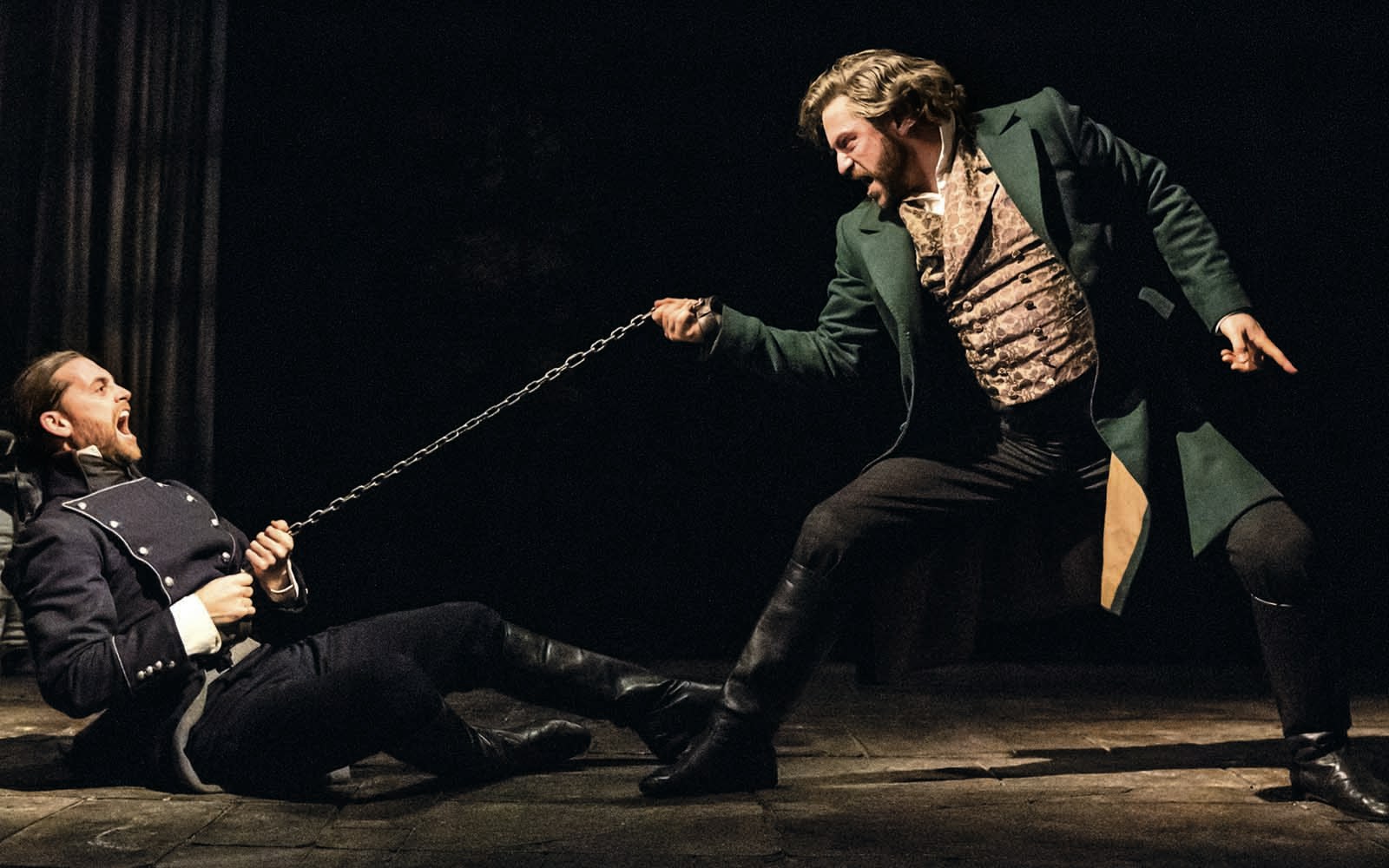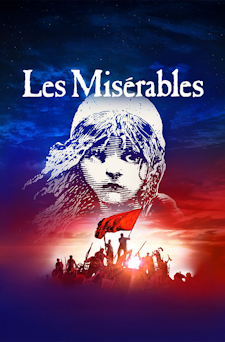Les Misérables West End soundtrack: A complete guide to the West End setlist

A brilliantly poetic musical based on Victor Hugo's novel, Les Misérables tells the story of the French peasant Jean Valjean and his quest for redemption. It weaves a tale of justice, love, and revolution in 19th-century France with a gutwrenching soundtrack that pierces the soul.
Here's every song on the Les Misérables West End soundtrack.
Prologue
Les Misérables opens with three prologues: Work Song, Valjean Arrested / Valjean Forgiven, and What Have I Done? We are introduced to Jean Valjean after he has served time for stealing a loaf of bread, and to the prison guard Javert, a significant antagonist in our protagonist's life. The prologues also introduce the primary themes of the musical - crime and punishment, salvation, kindness, and redemption.
At the End of the Day
Eight years later, the bitterness of workers in France enduring injustice echoes in the streets. They express their struggles and discontent with their harsh realities, setting the tone for the societal issues explored in the musical.
I Dreamed a Dream
The grandeur of the opening sequences finds reprieve in this ballad, a song that has transcended the musical and has become widely known outside theaters. It is sung by Fantine, one of many experiencing the injustices of a cruel society that left her a struggling single mother to Cosette.
Lovely Ladies
Fantine, following her ballad reflecting on lost hopes and dreams, descends into prostitution and through this song portrays the grim realities faced by women in desperate circumstances.
Who Am I?
The beauty of the Les Misérables soundtrack lies in its poignant soul-searching numbers that leave Valjean grappling with his identity and morality. Having secured a better life via a powerful position, he begins questioning whether to reveal his true self to save an innocent man and be condemned, or save himself and be damned.
Come to Me
A sickly Fantine calls out to her child, beckoning Cosette to come to her. Amid a deeply tragic moment, Valjean vows to take the young girl into his protection.
The Confrontation
The much-awaited face-off between Valjean and Javert finally comes to pass, yet it isn't just a violent display. The two express their opposing views on morality, blurring the lines between pure "good" or "evil," with a backing score that beautifully expresses their wildly different perspectives.
Castle on a Cloud
After hearing her name, you'd think Cosette's formal introduction would be jubilant, yet it showcases, once again, the injustice of a deeply flawed society. She endures much hardship and neglect at the hands of Madame Thenardier and slips into her own song about dreaming of a better life.
Master of the House
Cosette's song immediately sets up the Thenardiers as vile, evil, loathsome creatures. And yet, the following number establishes their story and characters with a track so entertaining it's hard not to be utterly amused.
The Waltz of Treachery
Alas, vile and loathsome they ultimately are, and the Thenardiers use their scammy ways to fleece Valjean of as much money as possible when he attempts to take Corsette away.
Look Down
Another time jump brings us to a new era, one where a gentle reprise of Look Down blends into the passionate optimism of youth: the revolution is upon us.
The Robbery
The many storylines and characters of Les Misérables come crashing together in this track, including Thenardier and his gang, his daughter Eponine, and the man she yearns for named Marius who himself yearns for Cosette, much to the chagrin of Valjean. Like a kaleidoscope, they all blend together, setting us up for what is to come.
Stars
Javert finally gets a number to showcase what truly drives him: his dedication to religion and what it compels him to do in favor of social order. In a moment of unabashed vulnerability, he shows the audience who he really is, which unbeknownst to him, makes him far more like Valjean than he ever seems to realize.
Eponine’s Errand
A cruel title for a cruel track, this one has Marius asking for Eponine's help in wooing her once-servant, Cosette. Despite the musical setting up the Thenardiers to be despised, it's hard not to feel a twinge of sorrow for Eponine's plight.
Red and Black
The student revolutionaries discuss their ideals and plans, contrasting their passionate ambitions with personal desires, all while Marius grapples with his growing love for Cosette. The track is brilliant in its execution of a core aspect of "the big picture": that everything is, ultimately, personal.
Do You Hear the People Sing?
A rousing anthem where the revolutionaries rally the citizens to join their cause against oppression, this song's legacy goes beyond theatrical flair. It has become a rousing call to action for real-life revolution, finding a place among rallies and protests.
In My Life
As the revolution rages on, so too does the confusion and torment of love. Valjean, Cosette, Marius, and Eponine - what, indeed, will become of them?
A Heart Full of Love
Marius and Cosette finally get their duet and it is an adorable and awkward display - true of any young love, yet also nuanced to reflect everything that has happened that led them here.
The Attack on Rue Plumet
Valjean, now dealing with multiple threats from Thenardier, his gang, Javert, and beyond, finds himself on the verge of going on the run, yet again.
One Day More
An ensemble piece where each character reflects on their hopes and fears for the impending day, building anticipation for the climax, this track sets up the interval by giving the audience a summary of the characters and storylines set to brilliant musicality that encapsulates each thread perfectly.
Building the Barricade
As Javert plans to infiltrate the revolution, Marius continues to harbor his feelings for Cosette, using Eponine to stay in touch with her.
On My Own
A gutwrenching ballad, we finally hear Eponine cry out in her agony, realizing that despite he grandest efforts, Marius would never love her back.
At the Barricade
The revolution's barricade is up and the roles soon reverse. What will become of Javert?
Little People
A brilliant track both musically and lyrically, we see a visual representation of how power dynamics function - and how the majority can often flip the scales when they recognize the power they hold.
A Little Fall of Rain
Eponine, despite her anguish, perseveres in helping Marius - and pays the ultimate price for her loyalty to her love. Perhaps one of the most painful sequences in the musical, it establishes yet again the idea of morally grey characters in this saga.
The First Attack
The role reversal and turning tides put Valjean and Javert at odds once again, but this time, the powers have tipped in Valjean's favor. Will he seal Javert's fate, or make a different choice?
Drink With Me
Much like with any battle, the revolutionaries take a moment to raise their glasses to happier times, while pondering the very real possibility that they might lose everything for their cause.
Bring Him Home
In a tender moment, Valjean says a prayer for Marius's safety, offering his own life in place of Marius's for Cosette's sake. It showcases the transformative power of love and brings Valjean's redemptive arc to the forefront.
The Second Attack
Despite their earlier wins, the revolution is running out of ammunition and allies. Tragedy seeps closer as our characters make difficult choices.
Dog Eats Dog
As Valjean attempts to rescue Marius he confronts Javert yet again, only this time, they have both been changed by what has transpired.
Javert's Suicide
Javert gets his big soul-searching number, one that has him face the gap between what his code commands him to do and what he has just done.
Turning
Revolution is, and always has been bloody, but more importantly, it has often been spearheaded by the youth who choose to fight for their futures, and often die trying. This lament is one of the town's women recalling the "children of the barricade."
Empty Chairs at Empty Tables
The hollowness that follows a defeat as great as this is too heavy a burden to bear, and Marius stands at the crossroads, mourning the loss of his friends after the failed revolution and reflecting on the cost of their ideals.
Every Day
Marius and Cosette duet once more, affirming their love and vowing to live on, as Valjean comes to accept this new reality.
Valjean's Confession
In a full circle moment, Valjean finally embraces his original identity, revealing who he is and accepting that he must let Cosette go.
Wedding Chorale
What's a wedding without a little drama? As Marius and Cosette take their vows, the Thenardiers lurk in the shadows, with information that might change everything.
Beggars at the Feast
The Thenardiers, ever smarmy, gloat at their recently acquired wealth, as Valjean begs for death.
Valjean's Death
"To love another person is to see the face of God," Valjean utters, as Fantine and Eponine return to claim him.
Do You Hear the People Sing?
Revolution isn't a single battle or person, nor is it one moment in time or a movement spurred by the moment. It is an ideal, a defiance of the world order, a hope for a better tomorrow no matter the cost today.
These songs, among others, intricately weave together the narratives of love, sacrifice, and redemption, making Les Misérables a timeless masterpiece in musical theater.
Book now
More reads





.jpg?auto=format&w=1231.2&h=716.4&q=90&fit=crop&crop=faces)





